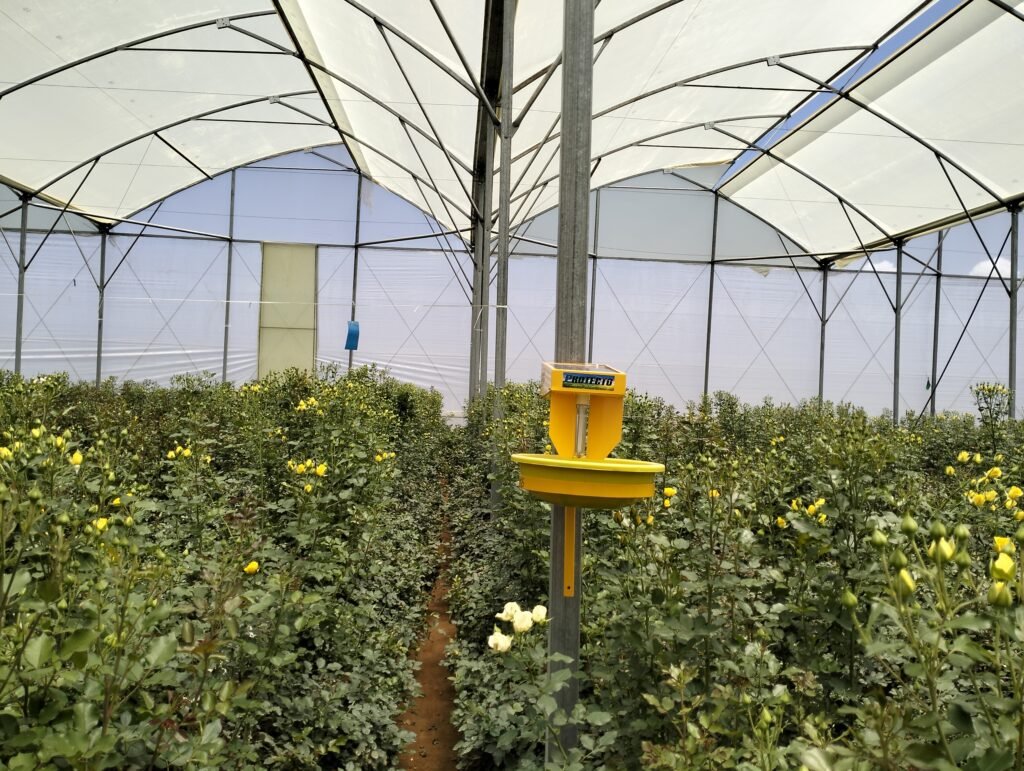By Murimi Gitari
Eco Bristo Limited, a Kenyan agritech startup behind solar-powered insect traps, is out to change the narrative by developing alternative sustainable solutions for farmers in Africa.
“Eco Bristo is dedicated to revolutionising pest management in agriculture using sustainable and eco- friendly technologies. We specialise in the development and distribution of solar-powered insect traps designed to address the pressing issue of pest infestations in farming. Our mission is to empower sustainable farming by providing alternative affordable and eco-friendly pest control technology and solutions,” says Mutuma Muriuki, the CEO and Founder of Eco Bristo.
Muriuki says his motivation to come up with alternative solutions for pest management stems from the urgent need to address the environmental and economic challenges caused by traditional pest management methods, which often rely on chemical pesticides. He notes that these pesticides harm ecosystems, pose health risks to farmers and can lead to pesticide resistance in crops.
“We aim to provide an alternative that not only manages pests effectively, relies on natural systems for pest management but also aligns with eco- friendly and sustainable agriculture practices. We envision a world where we consume chemical free foods,” Muriuki says.
The technology behind the company’s solar-powered insect traps was developed through extensive research and development efforts as well as improving on existing knowledge.
The initial research and development phase began in 2022 and after rigorous testing and improvements, they launched the first solar trap in 2023. The technology works by attracting pests using LED lights. Once attracted, the pests are captured in a container. Setting up the solar trap is straightforward as a user simply needs to place it strategically in the agricultural field and ensure it has access to sunlight.
The trap’s solar panel generates power during the day, which is used to operate the light to capture the pests at night and the captured pests can be safely disposed of and the trap is ready to resume operation. Muriuki says that the technology is versatile and effective against a wide range of insect pests that affect various crops such as vegetables, fruits and flowers. While it can target many types of pests, its efficacy may vary depending on the specific species present.
“We tailor the technology to address the most common and destructive pests in the regions where it is deployed, including the fall army worm, false codling moth, diamond black moth and even fruit flies,” he notes. The technology has proven to be highly effective in managing insect pests. Through field trials, they have observed significant reductions in pest populations, resulting in increased crop yields. The effectiveness of the technology varies depending on factors such as crop type, local pest species, and proper trap placement. However, it consistently provides an environmentally responsible and sustainable pest management solution.
Insects are attracted to the technology through a combination of factors. These include LED lights that mimic natural sources of attraction. This approach is designed to mimic the cues that pests rely on in their natural behaviour, drawing them to the trap where they are subsequently captured.
Eco Bristo offers a range of solar- powered insect traps tailored to various crops and pest species. These solutions are adaptable to different environmental conditions and crop types with their product line including trap models optimised for fruit orchards, vegetable farms and grain fields.
Each trap is designed to effectively manage pests that are specific to the area and crop, providing a comprehensive and sustainable solution for farmers. The company also has a biochar bio fertilizer as a new solution to farmers with severe soil degradation and its beta trials show significant improvement in soil regeneration and improved yields on various fruits and crops as well as carbon capture.
“As with any innovative technology, we face challenges, including scaling production to meet growing demand, raising awareness among farmers about sustainable pest management practices and navigating regulatory and market complexities.
However, we are committed to overcoming these challenges and continuously improving our solutions to better serve the agricultural community,” Muriuki says.
The company recently won an award at Ayute Africa challenge Kenya 2023 by Heifer Kenya in recognition of the company’s commitment to sustainable agriculture and innovation. Muriuki says to win this award, they had to demonstrate the effectiveness and environmental benefits of their solar-powered insect traps. They also showcased their dedication to promoting eco-friendly agricultural practices and fostering partnerships with local farming communities.
This award, according to the CEO, is a testament to the hard work, dedication and collaboration of his team, as well as the positive impact the technology has and will continue to have on agriculture and the environment. He says that Eco Bristo aims to expand its product line to address a wider range of agricultural challenges. This includes the development of new trap models for different crop types and the introduction of complementary technologies, such as smart sensors for real-time pest monitoring. They also aim to venture into products in soil fertility such as enhanced biofertilisers.
The company also plans to leverage data analytics and IoT (Internet of Things) technology to provide farmers with insights into pest behavior, trap performance, and optimal intervention timing. This data-driven approach will empower farmers to make informed decisions. “In line with the global trend toward sustainable agriculture, we intend to offer comprehensive solutions that encompass not only pest management but also soil health, water conservation, and biodiversity protection.
This holistic approach aligns with the broader goal of promoting environmentally responsible farming,” says the CEO. Some of the other future plans the company has is to foster collaborations with research institutions, agricultural universities, and environmental organizations that will contribute to ongoing innovation and the development of cutting-edge technologies in pest management. The company also plans to expand its educational initiatives, offering training programs and workshops to farmers, extension services, and agronomists.

